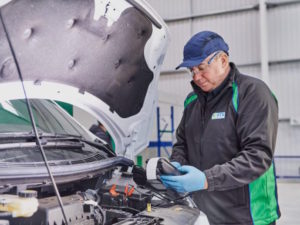Nearly 30% of vans fail their MOT due to a brake defect, leading to vehicle downtime and additional costs.

The data comes from ATS Euromaster, which says van drivers and van fleets need to take preventative maintenance or face the likelihood of MOT failure.
Mark Holland, operation director at ATS Euromaster, said: “An astonishing 29.3% of vans failed their MOT thanks to a brake defect of some manner. We expect this percentage to increase as this data was from 2020 – and vans have been working harder and longer since the pandemic, fuelled by the increase in the home delivery market.”
Vans are often run beyond four- and five-year lifecycles now and along with harder usage due to double-shifting to meet increasing demand for deliveries, vehicles are now more likely to have defects that could force them offroad.
But proactive maintenance could prevent such downtime and cut maintenance costs by tackling issues in advance – for example, identifying brakes that will require changing soon.
“Thanks to our Digital Vehicle Health Check (DVHC), which is carried out when a vehicle first comes into an ATS service centre, we can identify the issue, get approval for the additional work, and fully service the vehicle,” added Holland. “This proactive intervention saves vehicle downtime in the future as well as providing duty of care for drivers. And with an MOT you can prove that your van is fit for purpose.”
ATS Euromaster has also published its key maintenance points to help van owners and van fleets identify potential brake issues:
- Brake Fluid – This needs to be changed regularly. The fluid absorbs moisture and changes the boiling point, which reduces efficiency and leads to a ‘spongy’ pedal or potential brake failure.
- Brake Pads – Changing just the brake pads when the discs are an advisory will then result in pads potentially being changed again prematurely when the discs go below spec.
- Warped Brake Discs – These cause judder, the locking up wheels which can lead to skidding, as well as premature wear on pads, inefficient braking and potentially impact steering and suspension parts.
- Scored/Pitted Discs – Even if above spec on wear rates, scoring may cause reduced efficiency, noise, premature wear and increased heat leading to brake fade.
- Squealing/Noisy Brakes – This is often mistaken for dust or water between the pad and disc but could be the sign of major issues unfolding.
- Pulling to one side – Often mistaken for alignment or camber of the road but is also a major sign of brake issues and failing components
- Dashboard lights – Often ignored and left to fail an MOT or picked up on service, but by being caught early could save big repair bills later down the line.

